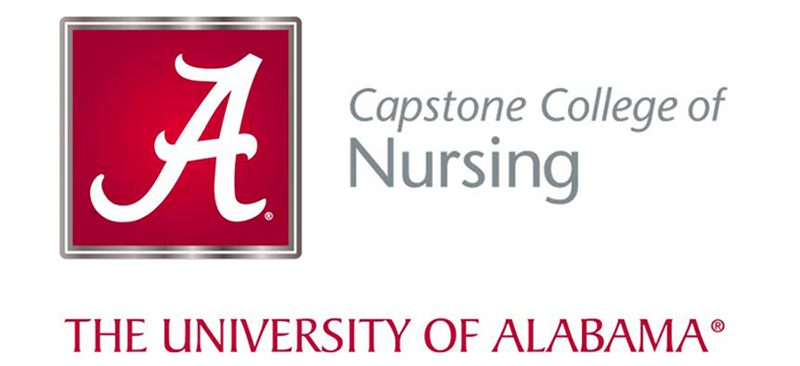

The purpose of the Joint Nursing Science Ph.D. program is to prepare nurse scholars who advance nursing science by generating new knowledge. It is a joint program between The University of Alabama in Huntsville (UAH) and The University of Alabama (UA).
- Program Outcomes
- Admission Requirements
- Program of Study: Full-Time Students
- Program of Study: Part-Time Students
- Knowledge Synthesis — As assessed by a comprehensive exam, students will:
- demonstrate substantive knowledge related to the body of literature and theories about rural and/or medically underserved populations to inform nursing practice; and
- appraise and synthesize models and theories from previously conducted research.
- Research Conduct — As assessed by a successfully defended dissertation, students will demonstrate the ability to design and conduct ethical and culturally competent nursing research that is theoretically, methodologically, and analytically sound with the potential to influence health outcomes and generate new knowledge.
- Research Dissemination — Students will contribute to nursing science by generating new knowledge and actively disseminating research at national and/or international venues and in respected peer-reviewed journals.
We accept BSN-prepared and MSN-prepared students into the Joint Ph.D. program. Admission requirements are the same except where noted below.
Admission to the Ph.D. program is determined by the Joint Ph.D. Oversight Committee who will assess the entire composite of information gained from a variety of sources. Each applicant must meet the following criteria and/or provide:
- An application to the Joint Ph.D. Graduate Program – Apply online (Opens in a new window)
- Official transcripts from each university or college attended sent to:
UAH Graduate Admissions
301 Sparkman Drive
SSB, Suite 222
Huntsville, AL 35899 - A minimum graduate Grade Point Average (GPA) of 3.0 on a 4.0 scale. Official transcripts must be sent to the university Graduate College.
- Resume or curriculum vitae.
- Three (3) letters of reference from professionals or professors who can adequately evaluate the applicant and the applicant’s previous work or potential for success. Two of the letters are strongly preferred from nurses with doctoral degrees.
- Scientific Writing Sample — This sample of your written work should demonstrate your intellectual ability (such as logic, critical thinking, analysis, or synthesis) and your technical writing skills (composition, grammar, references, or citations). For example, you could submit an academic paper, essay, published article, or a professional report written by you. If someone other than you contributed to this document (including editing), explain your contribution and the contributions of others.
- Statement of Purpose — In four double-spaced pages respond to the following:
- Why do you want to pursue a Ph.D. in Nursing Science?
- What professional goals do you hope to achieve during and beyond your Ph.D. program?
- Describe prior experiences that have prepared you for doctoral study (e.g. research, presentations, publications, leadership roles in practice, education, or professional organizations).
- What are your research interests?
- How might research in this area advance the science of nursing?
- RN Licensure Requirement —
- Applicants must have an active, unencumbered license as a Registered Nurse in the United States. Applicants who hold an equivalent certification or licensure outside of the U.S. will be considered on a case-by-case basis.
- Applicants who are not yet licensed will be considered for conditional admission, but proof of licensure must be submitted prior to completing 12 credit hours of Ph.D. coursework
- Transfer applicants — Evidence of good academic standing at the current institution. Determination of whether or not credits may be transferred will be based on evaluation of comparability of requested transfer course to Ph.D. course and university policy, and is completed after admission.
After the first review of the application and at the request of the Joint Ph.D. Oversight Committee, applicants will be asked to successfully complete personal interviews with Oversight Committee members. Research interests, professional involvement, and motivation for successful completion of doctoral study in the Ph.D. program will be assessed.
Completed applications are reviewed by the Oversight Committee throughout the year for summer enrollment. Applications (with GRE scores, transcripts, etc.) must be completed by April 1 if enrollment in the program is desired for that summer. Applicants must register for courses within two (2) years of acceptance into the Ph.D. program, or the acceptance is void.
Upon admission, you will receive written notification of admission from the Deans of the Joint Ph.D. Program. You will also receive a letter from the graduate advisors at both UA and UAH outlining requirements for entry into the Ph.D. program. Admission is contingent upon providing documentation of a background check and drug screen and results were acceptable to the admission committee.
Students who are enrolled in the Joint Nursing Science Ph.D. program will be divided evenly between UA and UAH for administrative purposes. Applicants who are employees of either UA or UAH will be enrolled in the University of their employment because of the restriction that employee tuition waivers can only be used on the campus of the individual’s employment.
The Joint Ph.D. program requires students to visit campus for three days in the Summer each year they are in the program for an intensive experience. This is a mandatory intensive experience and all students are expected to attend.
BSN to PhD students program of study will include three 1-hour seminars designed to support their transition into doctoral-level study.
Total Credit Hours: 63
Summer I: 6 credit hours (3 per course)
- NUS 750: Philosophy of Science
- NUS 752: Informatics for Healthcare Terms and Scholarly Inquiry
Fall I: 9 credit hours (3 per course)
- NUS 754: Ethical Conduct and Legal Issues in Research
- NUS 760: Statistics I (includes data management)
- NUS 764: Scientific Writing
Spring I: 9 credit hours (3 per course)
- NUS 756: Application of Theoretical Models
- NUS 758: Quantitative Research Methods and Design
- NUS 762: Healthcare Policy for Rural and Medically Underserved Populations
Summer II: 6 credit hours (3 per course)
- NUS 766: Epidemiology in Rural and Medically Underserved Populations
- NUS 772: Qualitative Research Methods
Fall II: 9 credit hours (3 per course)
- NUS 768: Statistics II
- NUS 770: Grant Writing
- Cognate I*
Spring II: 6 credit hours (3 per course)
- NUS: 776 Advanced Research Methods
- Cognate II*
Maymester I
- NUS 798: Competency Assessment
Summer III: 9 credit hours
- NUS: 799 Dissertation
Fall III: 9 credit hours
- NUS: 799 Dissertation
Cognates*: All courses are 3 credit hours
- NUS 780: Omics Cognate I: Introduction to Omics
- NUS 781: Omics Cognate II: Omics and Nursing Research
- NUS 782: Nursing Education Cognate I: Curriculum Development and Program Evaluation for Nurse Educators
- NUS 783: Nursing Education Cognate II: Instructional Methods and Assessment in Nursing Education
- NUS 784: Nursing Technology Cognate I: Data Science & Emerging Technologies for Healthcare
- NUS 785: Nursing Technology Cognate II: Research and Development of Innovative Health Information Technology
BSN to PhD students program of study will include three 1-hour seminars designed to support their transition into doctoral-level study.
Total Credit Hours: 63
Summer I: 6 credit hours (3 per course)
- NUS 750: Philosophy of Science
- NUS 752: Informatics for Healthcare Terms and Scholarly Inquiry
Fall I: 6 credit hours (3 per course)
- NUS 760: Statistics I (includes data management)
- NUS 764: Scientific Writing
Spring I: 6 credit hours (3 per course)
- NUS 756: Application of Theoretical Models
- NUS 758: Quantitative Research Methods and Design
Summer II: 6 credit hours (3 per course)
- NUS 766: Epidemiology in Rural and Medically Underserved Populations
- NUS 772: Qualitative Research Methods
Fall II: 6 credit hours (3 per course)
- NUS 754: Ethical Conduct and Legal Issues in Research
- NUS 768: Statistics II
Spring II: 6 credit hours (3 per course)
- NUS 762: Healthcare Policy for Rural and Medically Underserved Populations
Summer III: no courses
Fall III: 6 credit hours (3 per course)
- NUS 770: Grant Writing
- Cognate I*
Spring III: 3 credit hours
- NUS 776: Advanced Research Methods
- Cognate II*
Maymester I
- NUS 798: Competency Assessment
Summer IV: 6 credit hours
- NUS 799: Dissertation
Fall IV: 6 credit hours
- NUS 799: Dissertation
Spring IV: 6 credit hours
- NUS 799: Dissertation
Cognates*: All courses are 3 credit hours
- NUS 780: Omics Cognate I: Introduction to Omics
- NUS 781: Omics Cognate II: Omics and Nursing Research
- NUS 782: Nursing Education Cognate I: Curriculum Development and Program Evaluation for Nurse Educators
- NUS 783: Nursing Education Cognate II: Instructional Methods and Assessment in Nursing Education
- NUS 784: Nursing Technology Cognate I: Data Science & Emerging Technologies for Healthcare
- NUS 785: Nursing Technology Cognate II: Research and Development of Innovative Health Information Technology
Contact

Academic Advisor, Graduate Programs
University of Alabama in Huntsville
College of Nursing
NB 214

Coordinator of Graduate Student Services
University of Alabama
Capstone College of Nursing